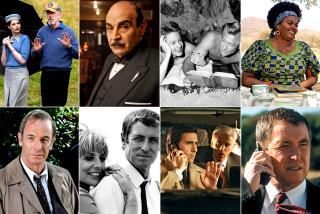MOVIE REVIEW : ‘Quinn’: Island Thriller Ventures Off Beaten Path
- Share via
The best Hollywood mystery thrillers of the ‘40s and ‘50s emphasized character, atmosphere and style. In the ‘80s, they went in another direction, zeroing in on blood, guts and car-crashes, a lot of high-speed catastrophes glued together with rock ‘n’ roll and smirking co-stars.
That’s why “The Mighty Quinn” (AMC Century 14) is fun. Though based on a novel, “Finding Maubee,” by a writer, A.H.Z. Carr, whose work hails back to the Ellery Queen-Raymond Chandler era, it’s definitely a new style of thriller. The cars crash, blood spurts, sex and helicopters explode--but “Quinn” goes for the old-line virtues, too. The movie sparkles with playful tension, bubbles with amiability. The plot is formula, unsurprising, but the film makers and cast seem to be enjoying themselves; their sheer ribald exhilaration becomes infectious.
Set in Jamaica, “Quinn” focuses on Xavier Quinn (Denzel Washington), a cop with family troubles, and his relentless pursuit of his boyhood buddy, the elusive ganja-puffing island idol Maubee (Robert Townsend), for a dubious murder involving snakes and scandals in high places. Hanging on the sidelines, while the two twist their way through all the sinuous alleys, collapsible houses, tropical streets and crystalline beaches are a gallery of suspects: M. Emmet Walsh in another of his sneaky-mean, smile-while-I-kill-ya-buddy roles; James Fox as a plastic priglet; Mimi Rogers as seductive but bored wife of a wealthy resort manager; Norman Beaton as a timid blowhard of a governor; Esther Rolle as a wheelchaired voodoo mama; and Sheryl Lee Ralph as Xavier’s furiously sexy ex.
The characterizations are relatively shallow; compare Beaton’s cheeky histrionics here, for example, with his magnificent performance as cricketer Willie Boy in “Playing Away.” But they’re done with exhilaration and dash. The exaggerations always seem tongue-in-cheek, and Washington has the right presence to anchor this kind of comic thriller: charged, quiet, charismatic, a lot like the young Sidney Poitier. At the core of the movie is the relationship between the strait-laced Quinn and his scapegrace lothario buddy Maubee. And perhaps it is a weakness of “Quinn” that we don’t see Townsend that often; he is basically doing an extended cameo, skittering around the edges of the film like an antic ghost. Over both of them, in the darkness, are the real killers, playing dangerous games of money, war and conquest.
Maubee seems to incarnate temptation and irresponsibility, especially for the broken-up family man, Quinn. Maubee symbolizes the life he could have lived, the easy road he could have boogied down--as Quinn gets more and more trapped in bureaucracy and alienated from his roots, his woman and child, his island ties. The scene where the two fall asleep in an ocean-side convertible, the wanderer and the cop manacled together, is one of the movie’s emotional nerve-ends. But it’s far too short.
The director and the writer, Carl Schenkel and Hampton Fancher, don’t dig down very deep. But they blow everything to hell very stylishly and they get some of the often-lost thriller virtues: An idiosyncratic, pungent milieu, robust characters, a patina of cynical political observation.
With cinematographer Jacques Steyn, Fancher uses a flashy, breezy, deep-focus look that seems to mix “Touch of Evil” tracks with “Kiss Me Deadly” angles, while soaking up a lot of lemony Jamaican sunlight and reviving that atmosphere of deep corruption and rain-soaked night life that characterized classic film noir. Whether as thriller or carnival, reggae romp or killer comedy, “The Mighty Quinn” is fun in a minor key, blood sport with a beat.
More to Read
Only good movies
Get the Indie Focus newsletter, Mark Olsen's weekly guide to the world of cinema.
You may occasionally receive promotional content from the Los Angeles Times.






